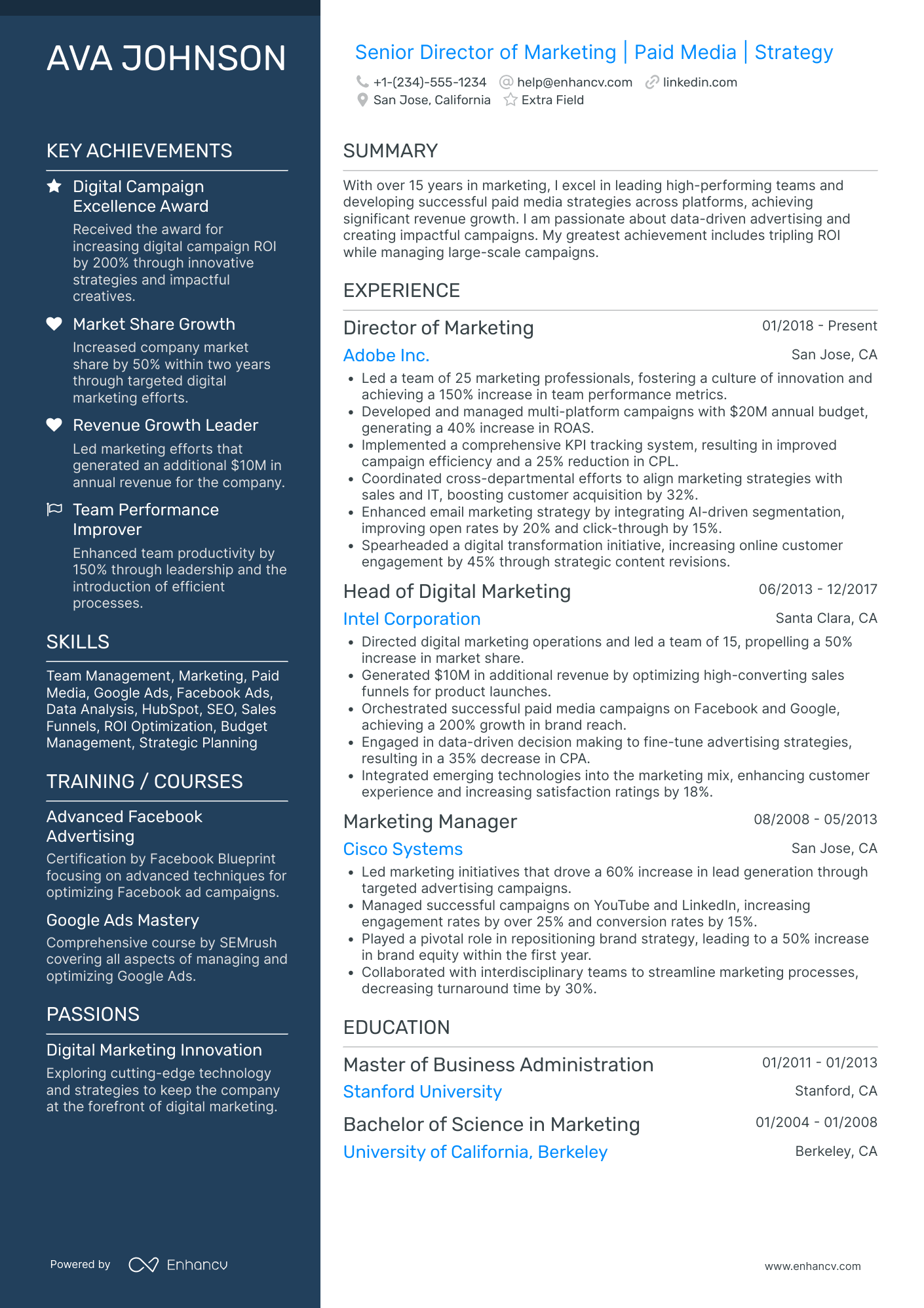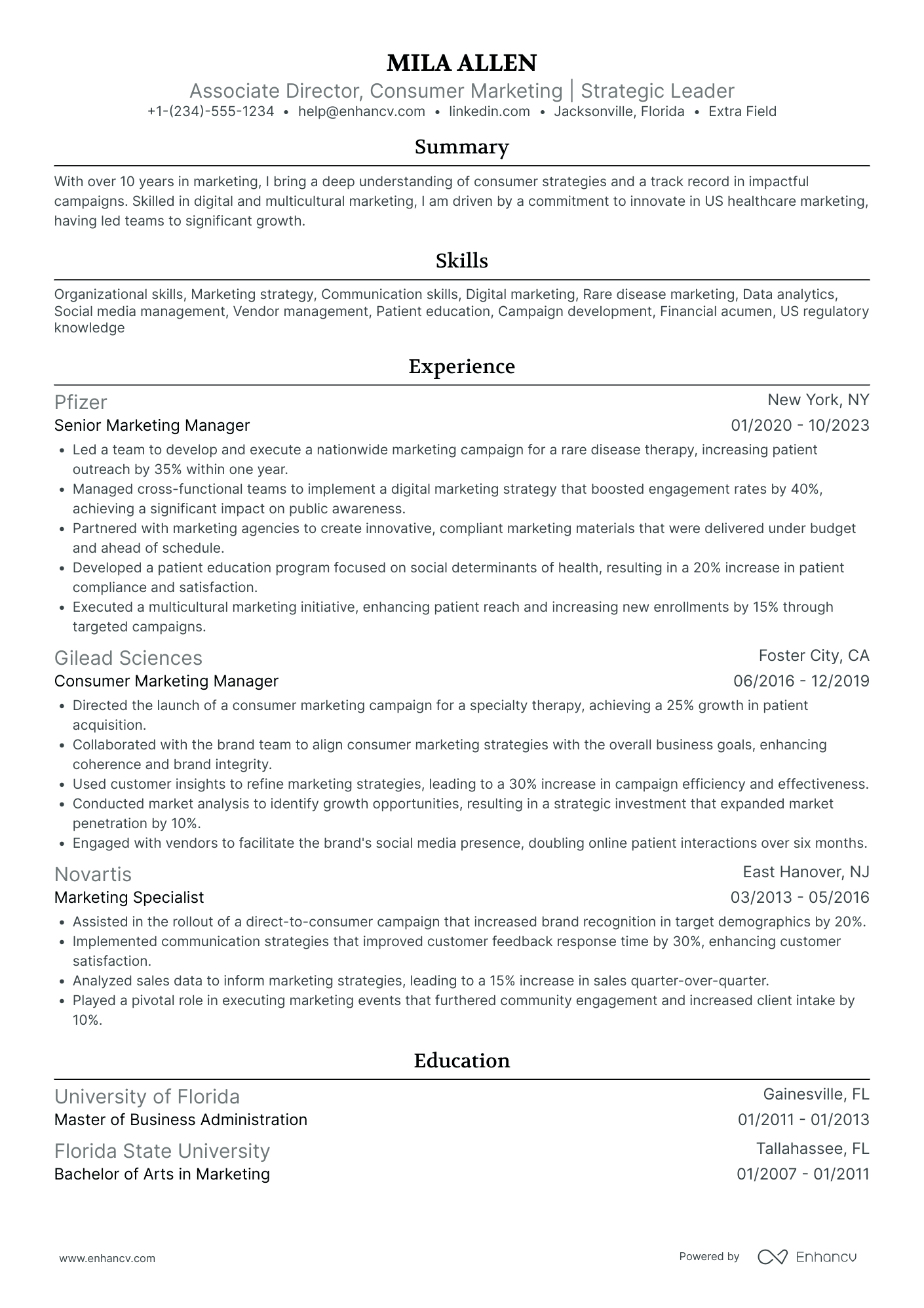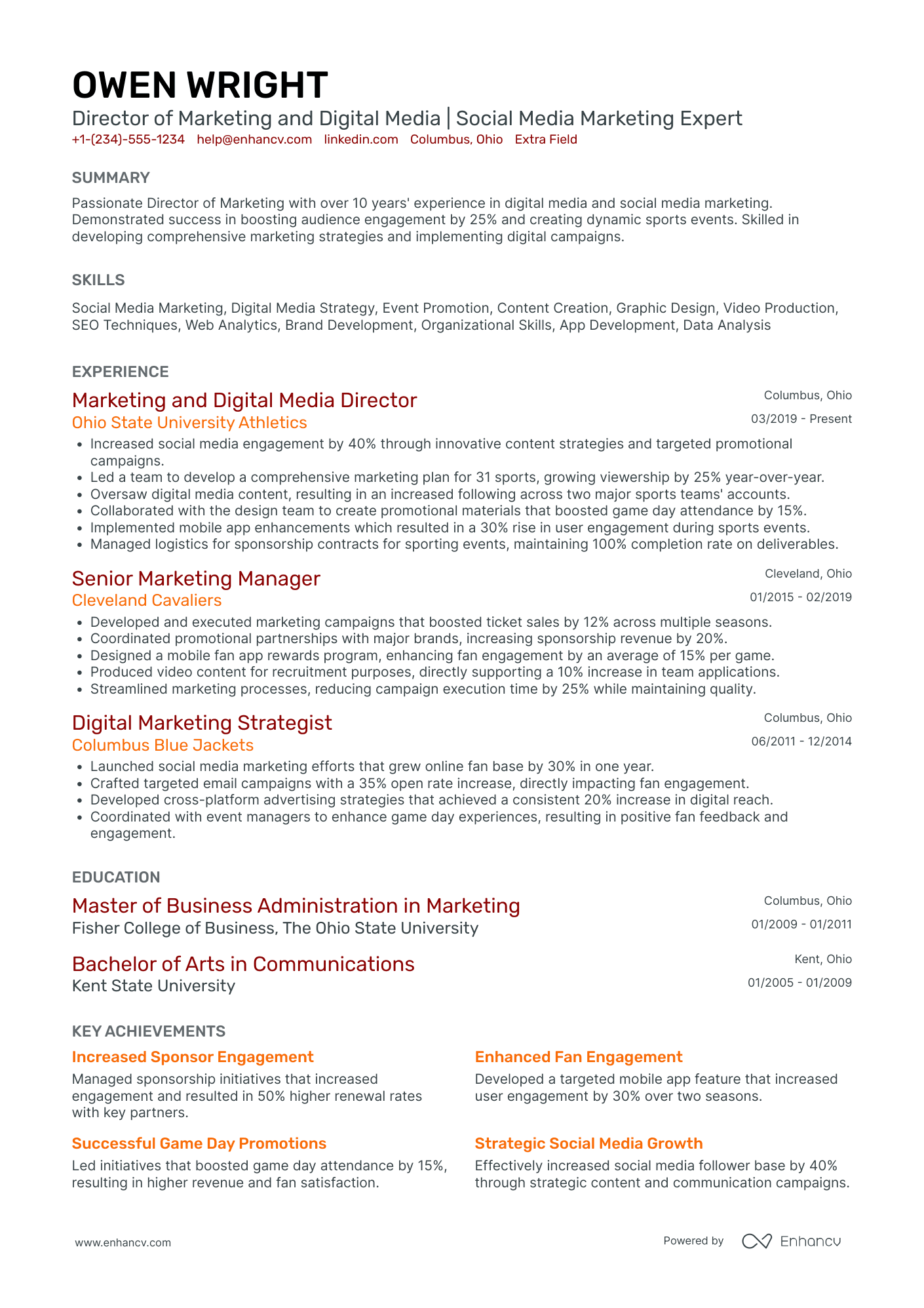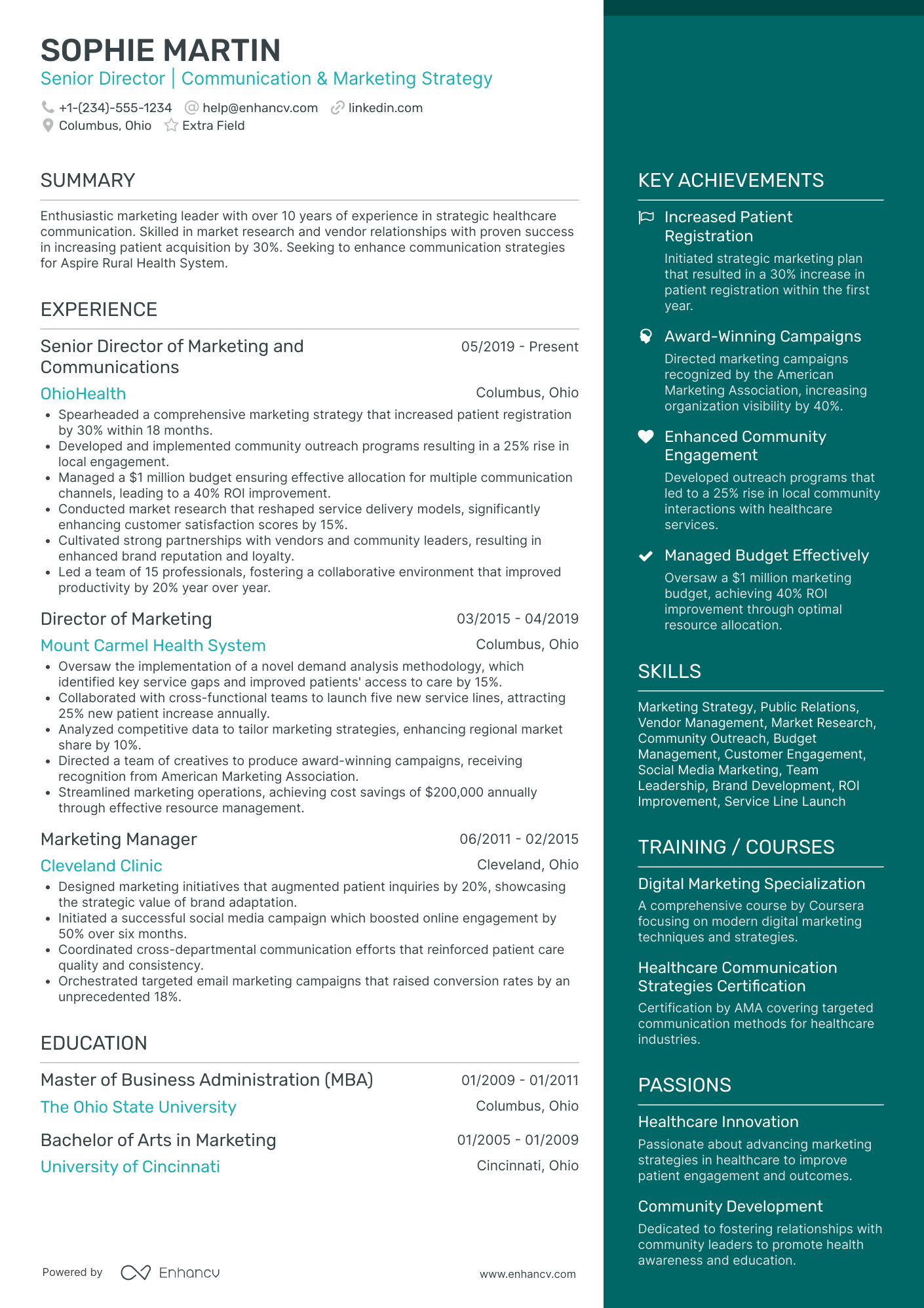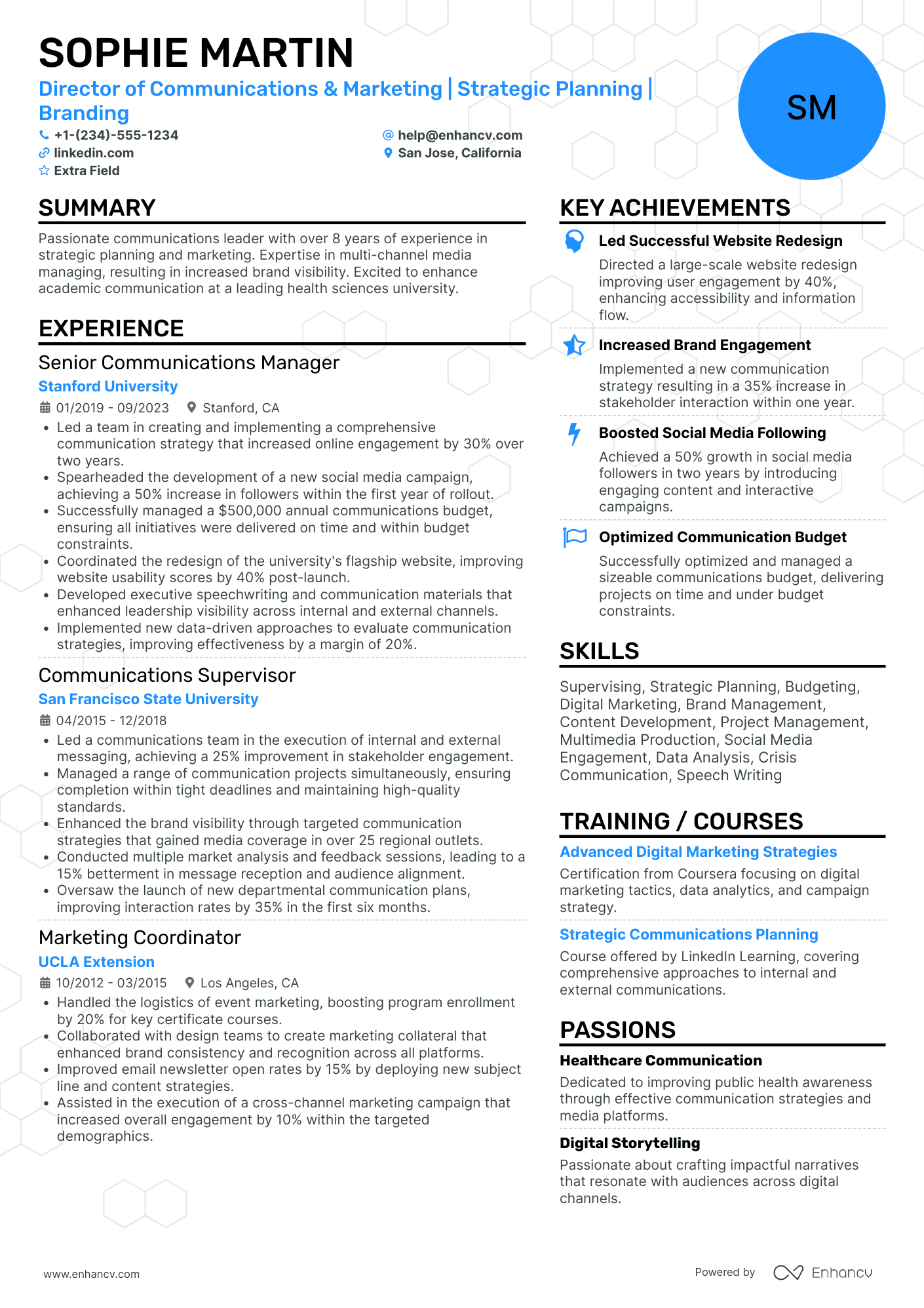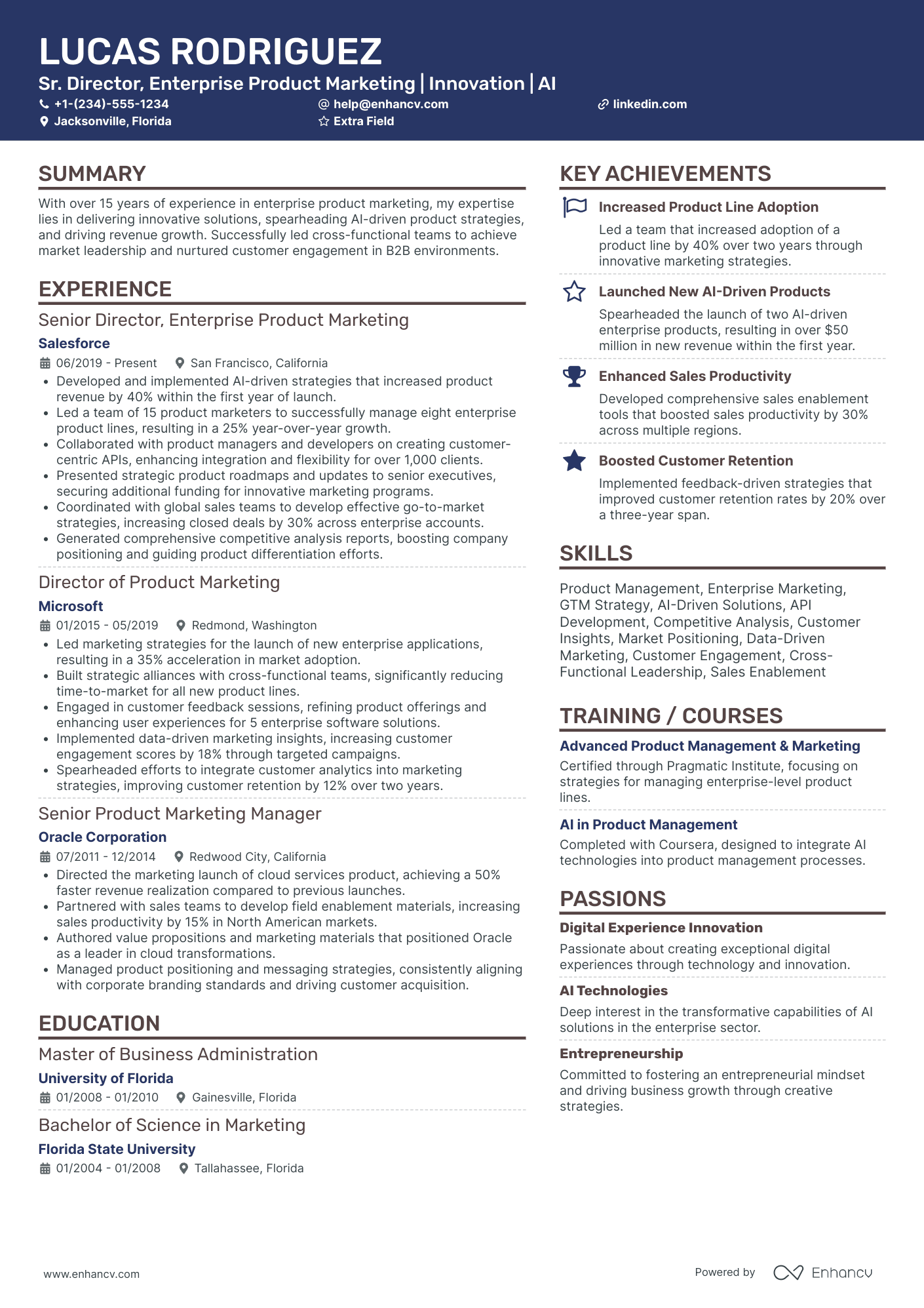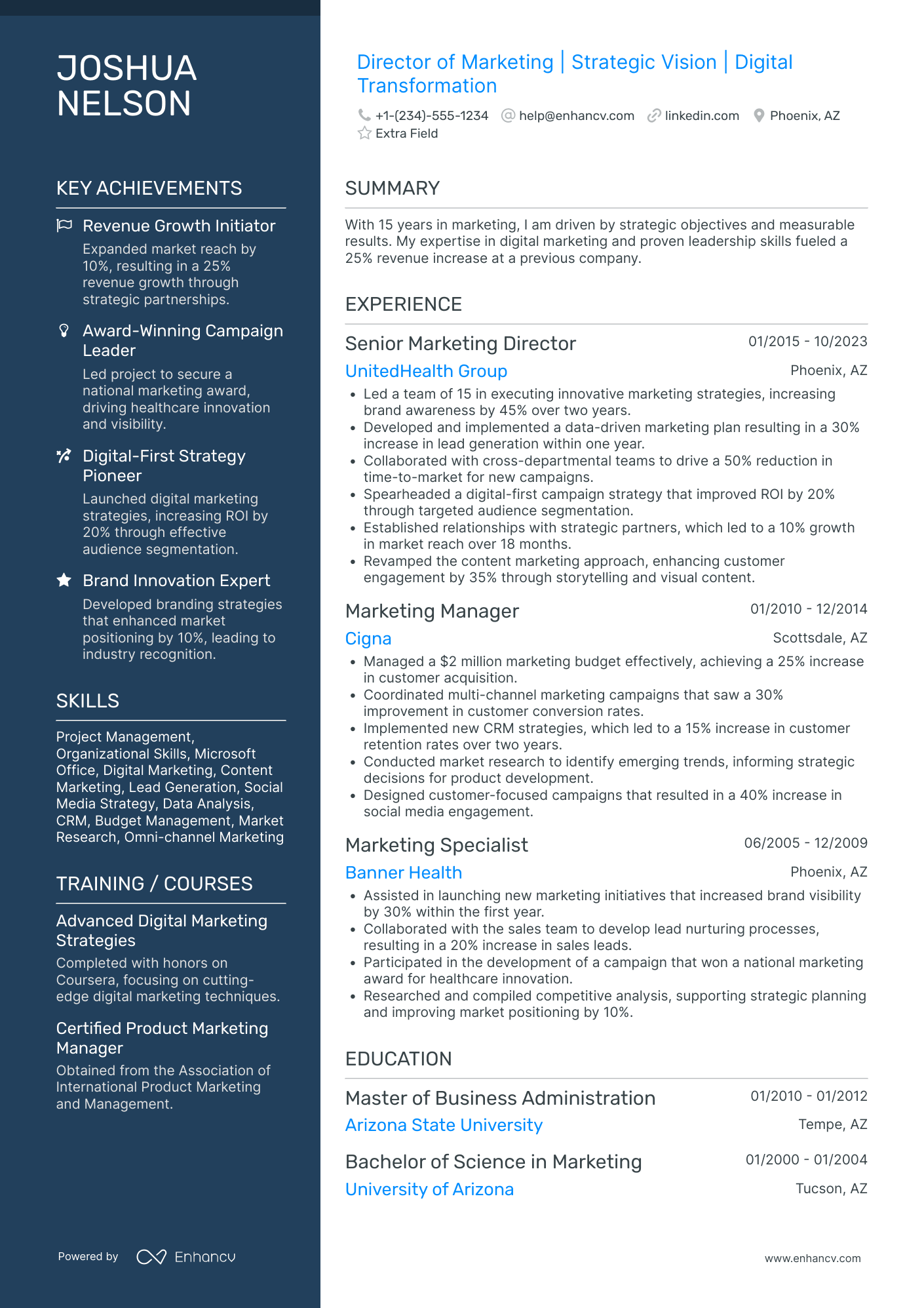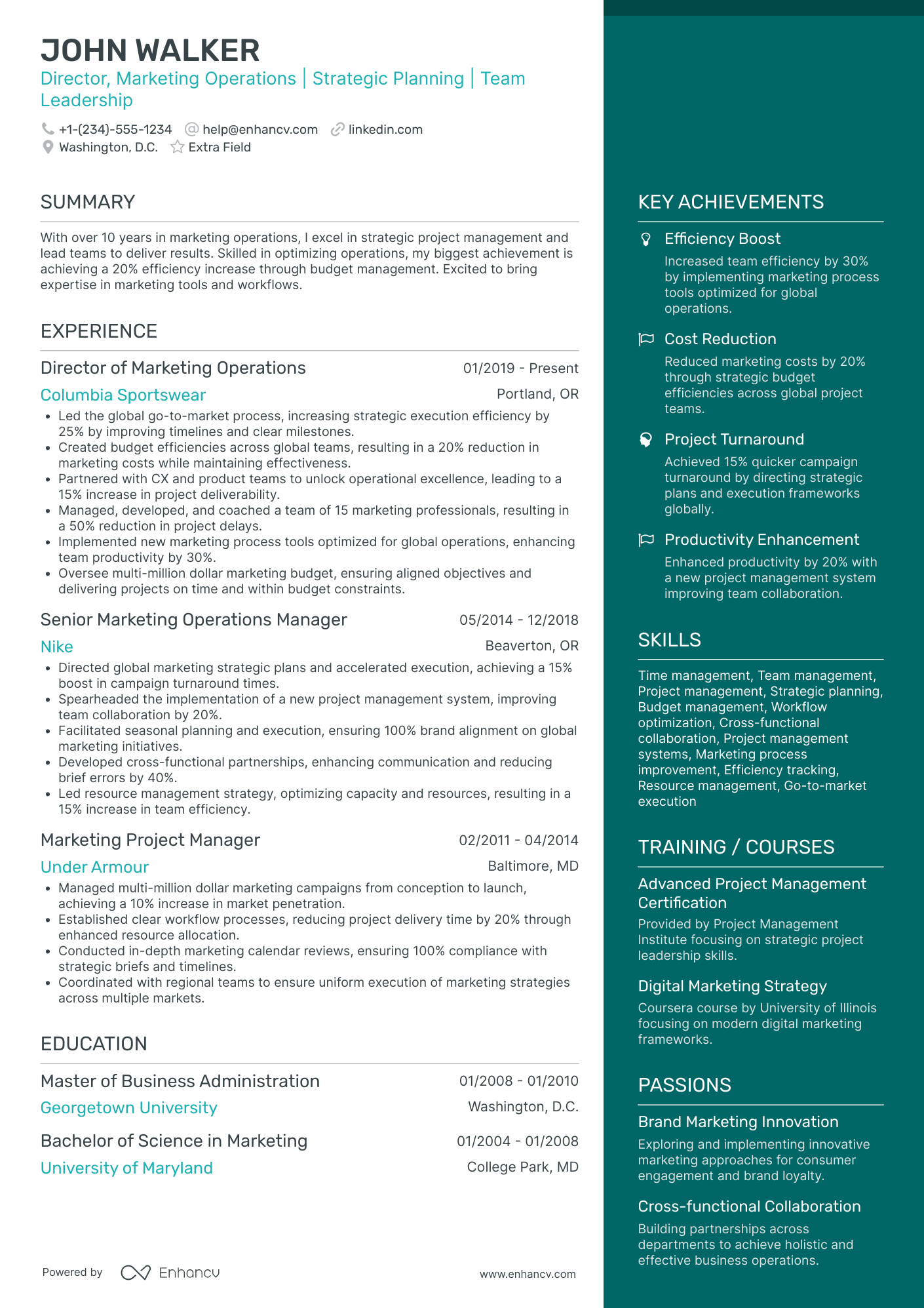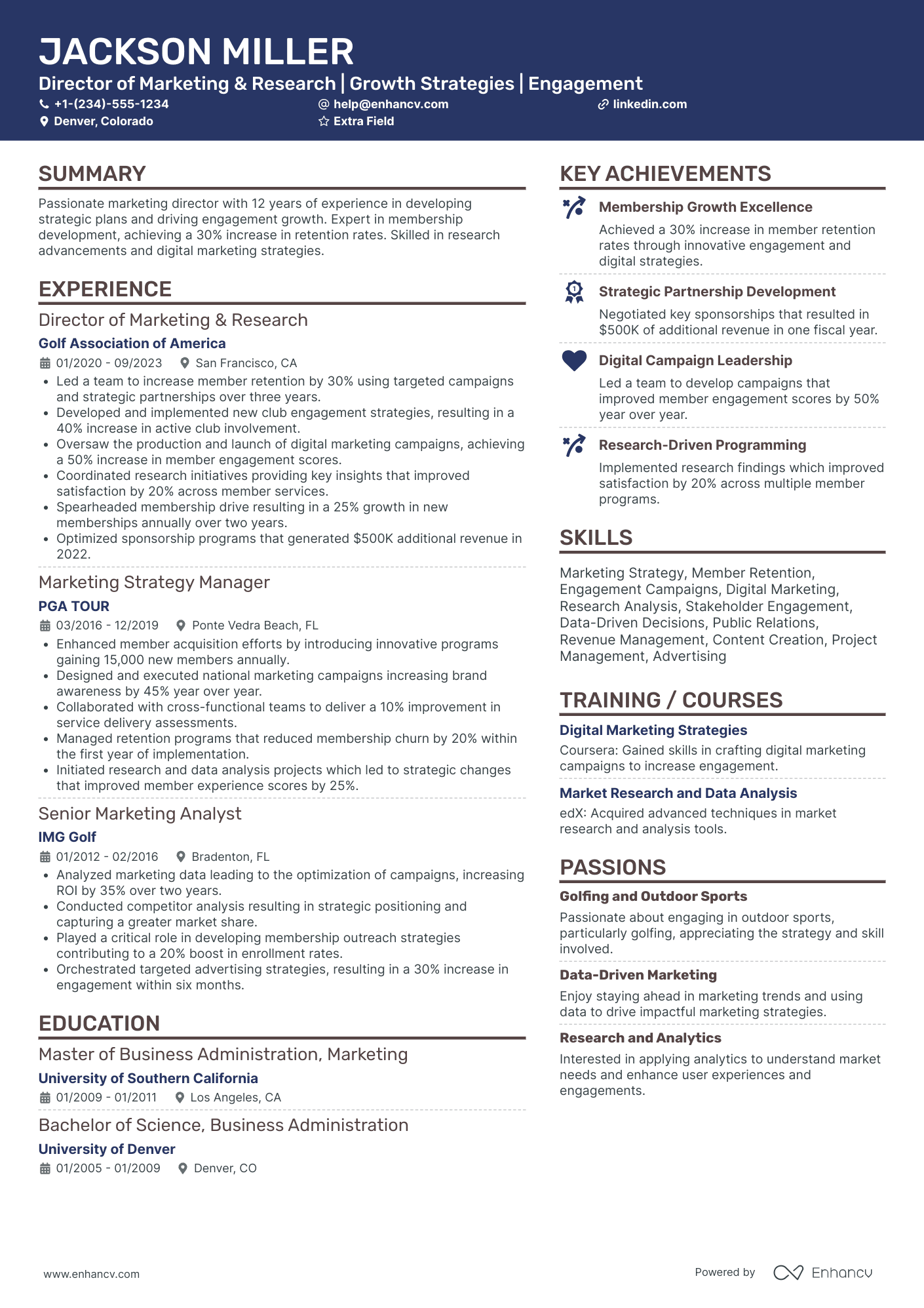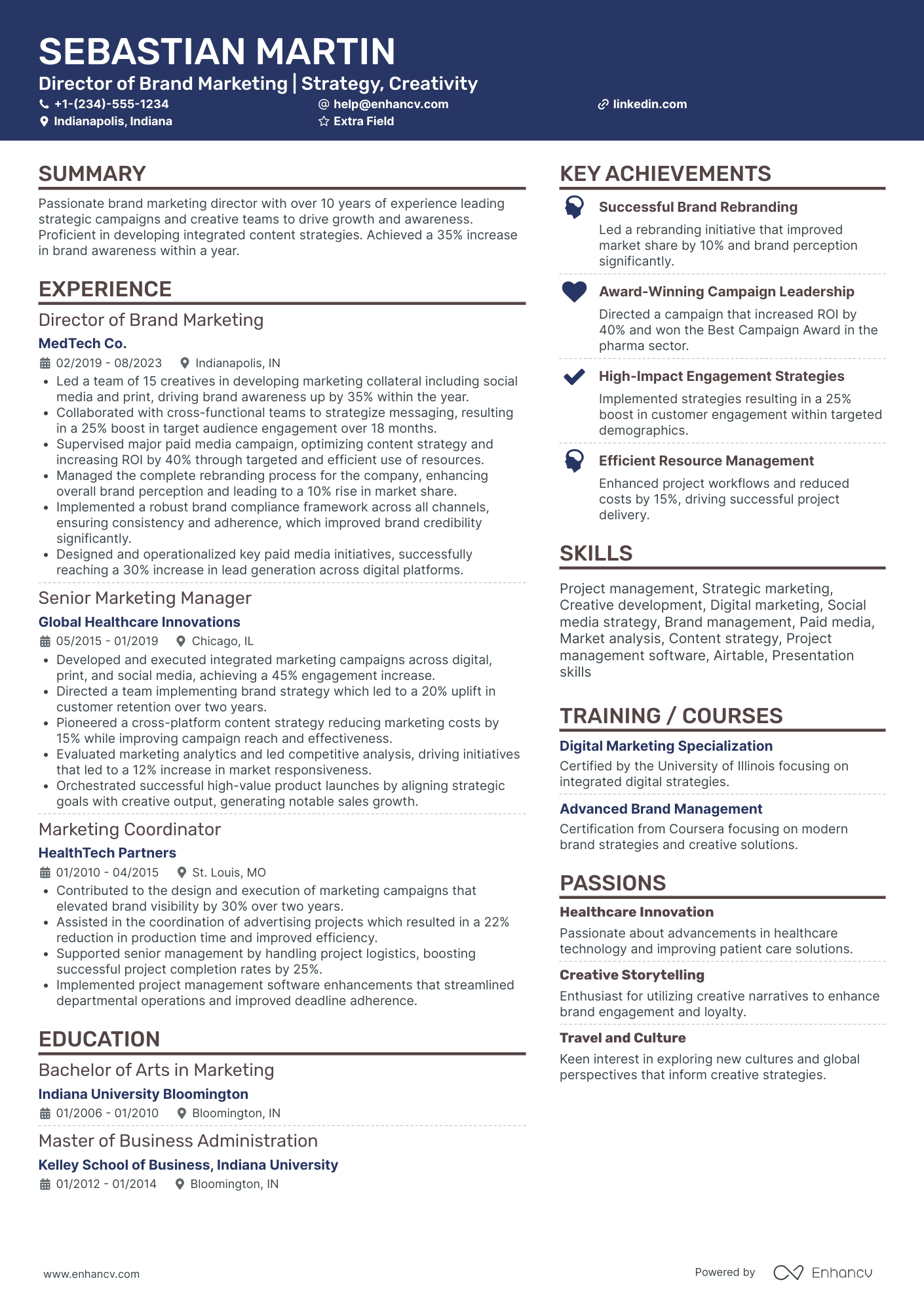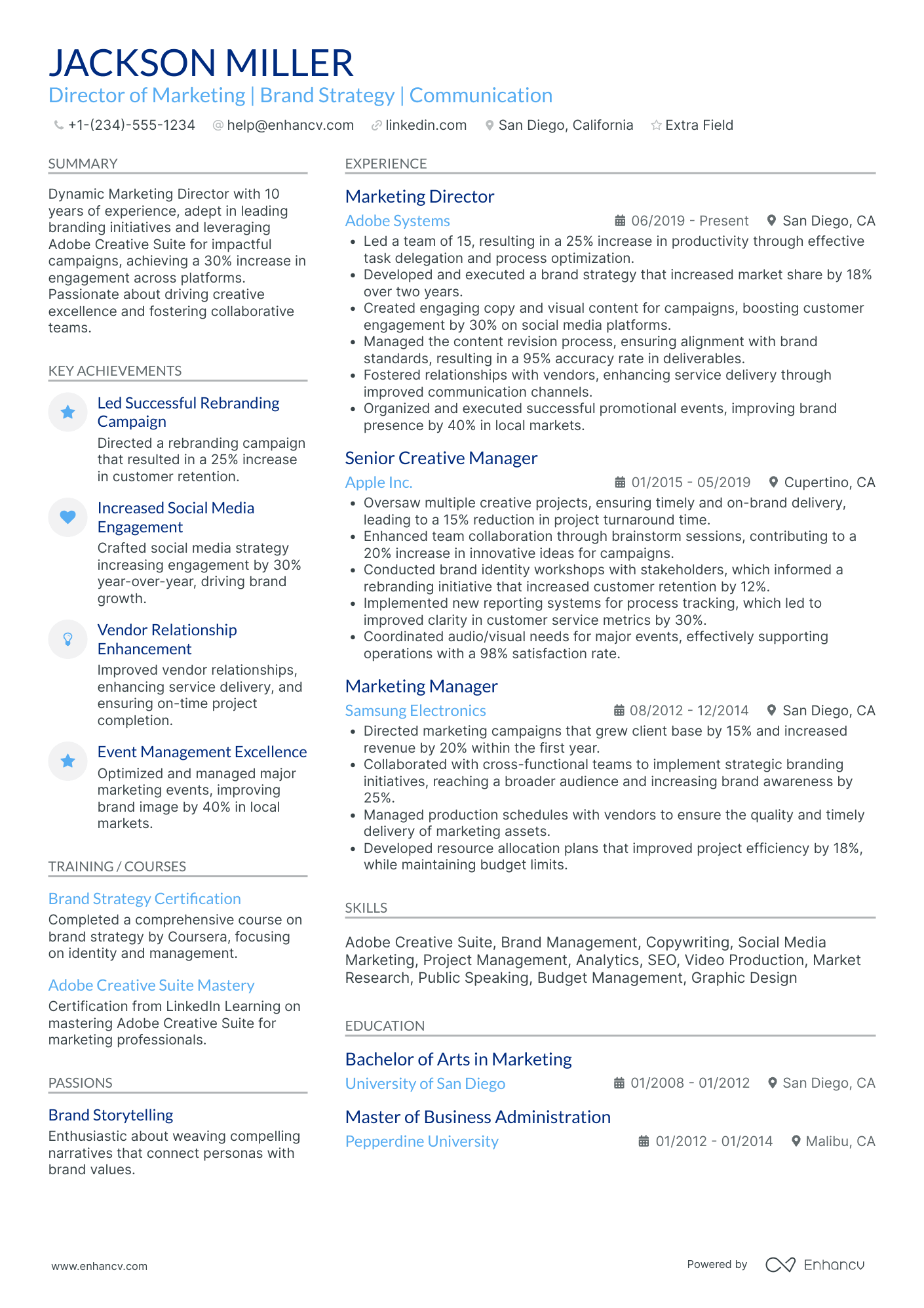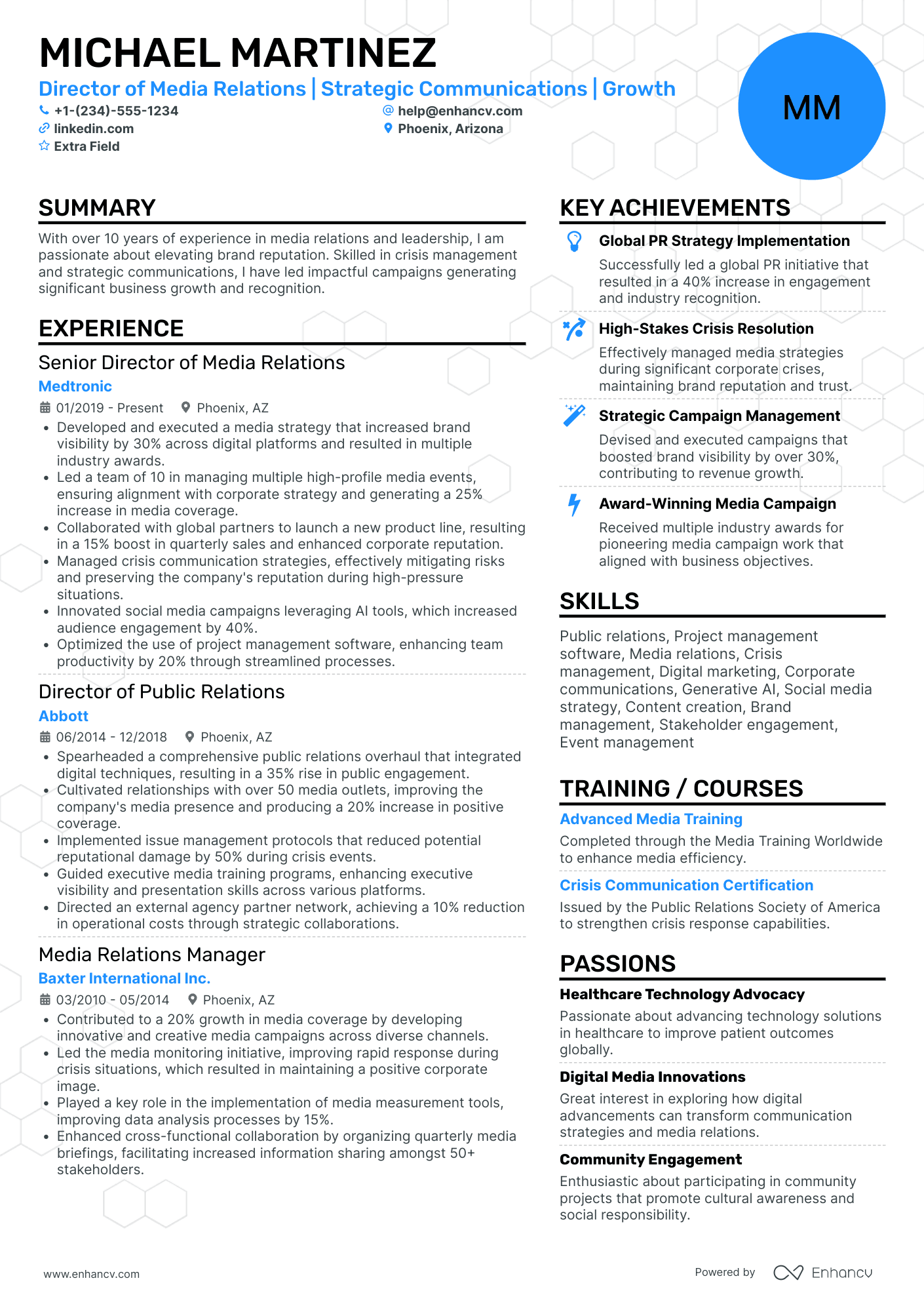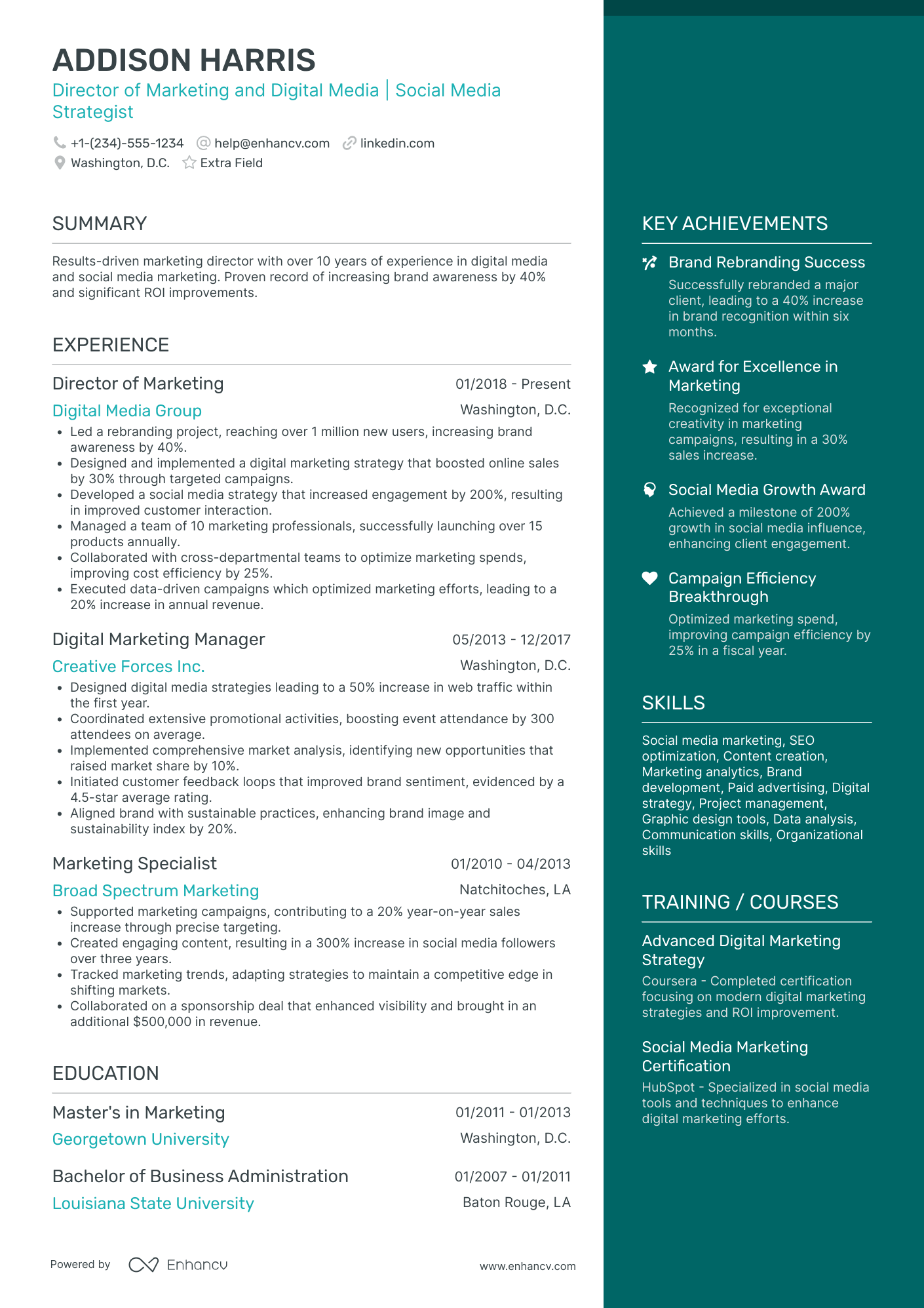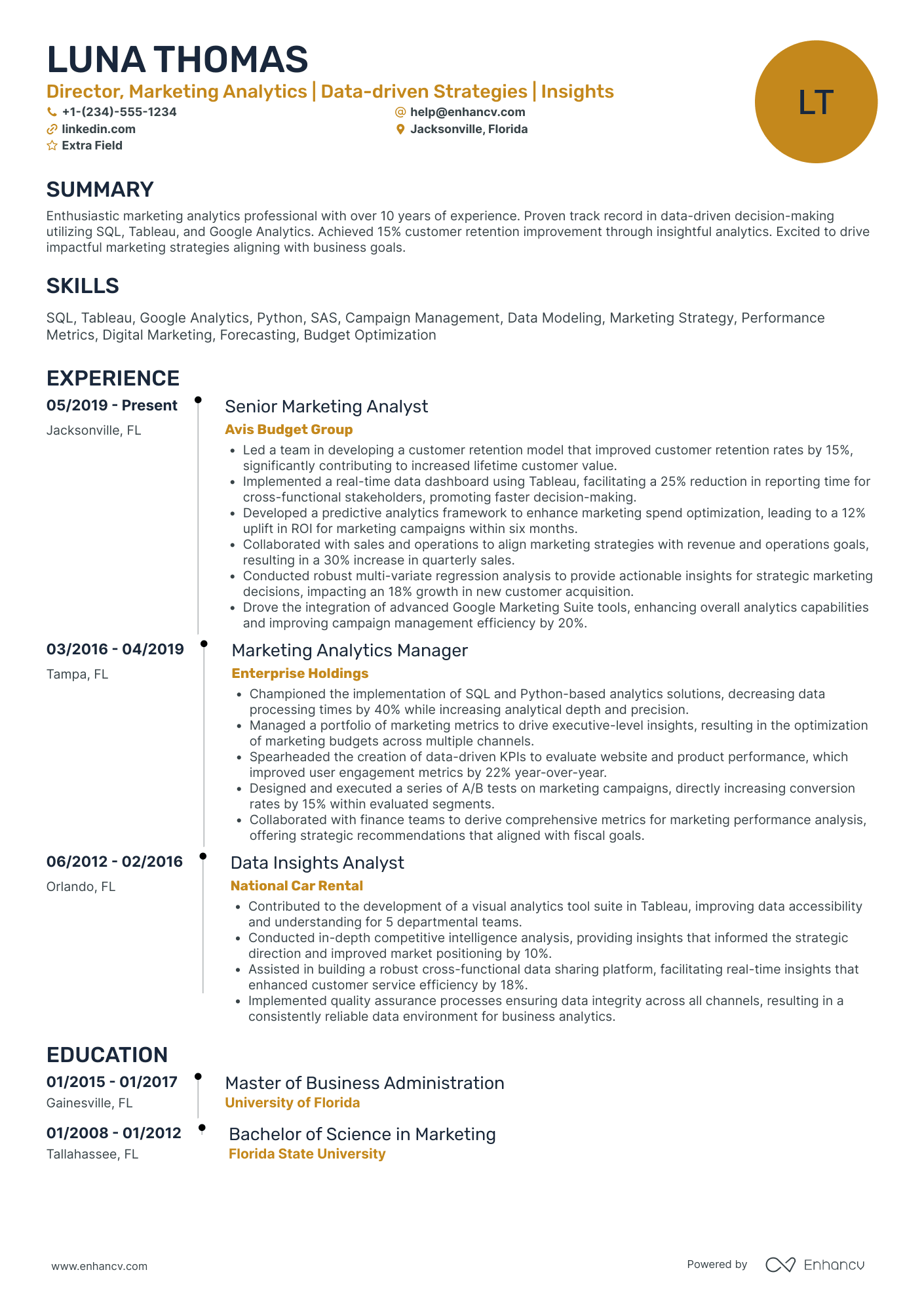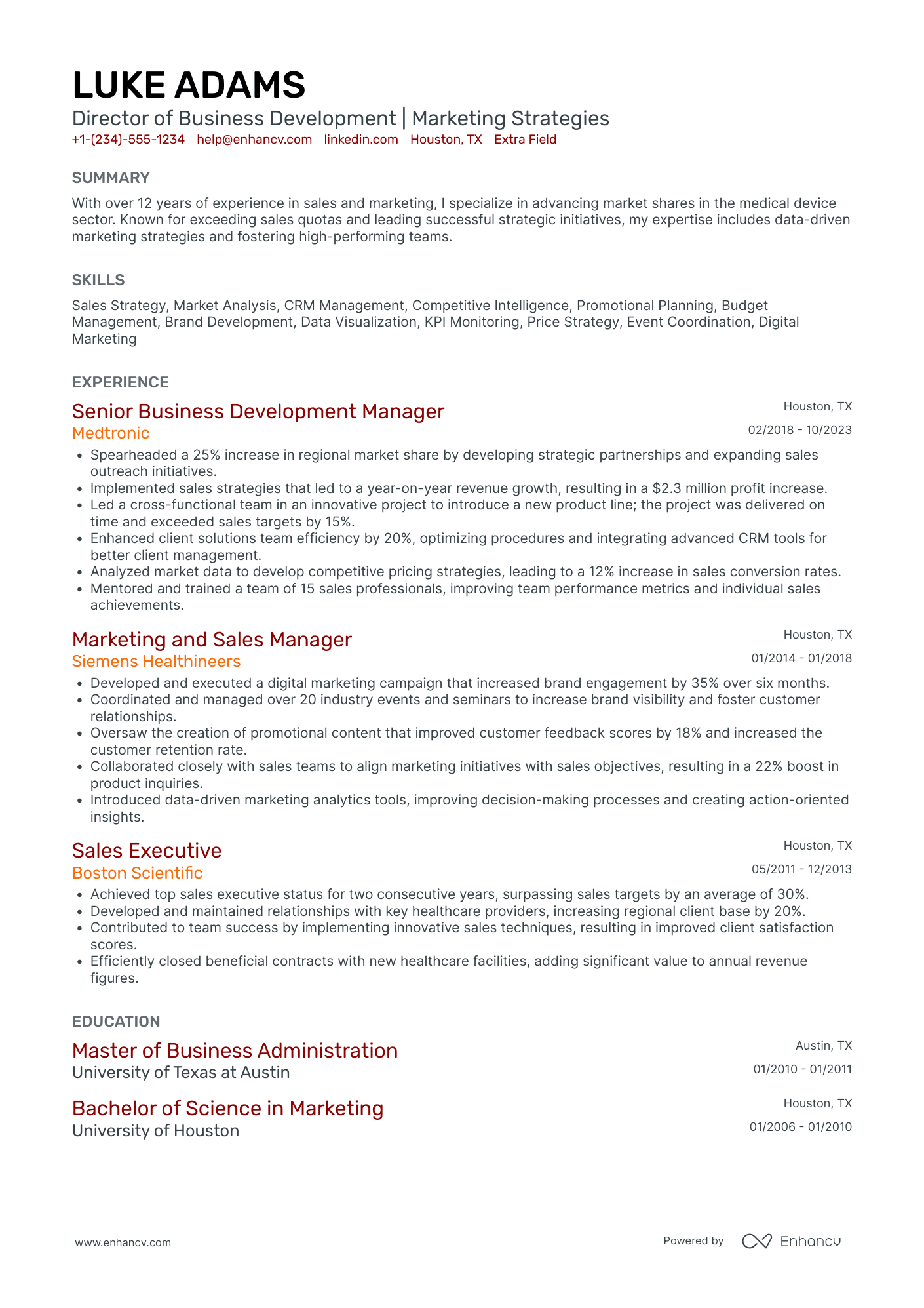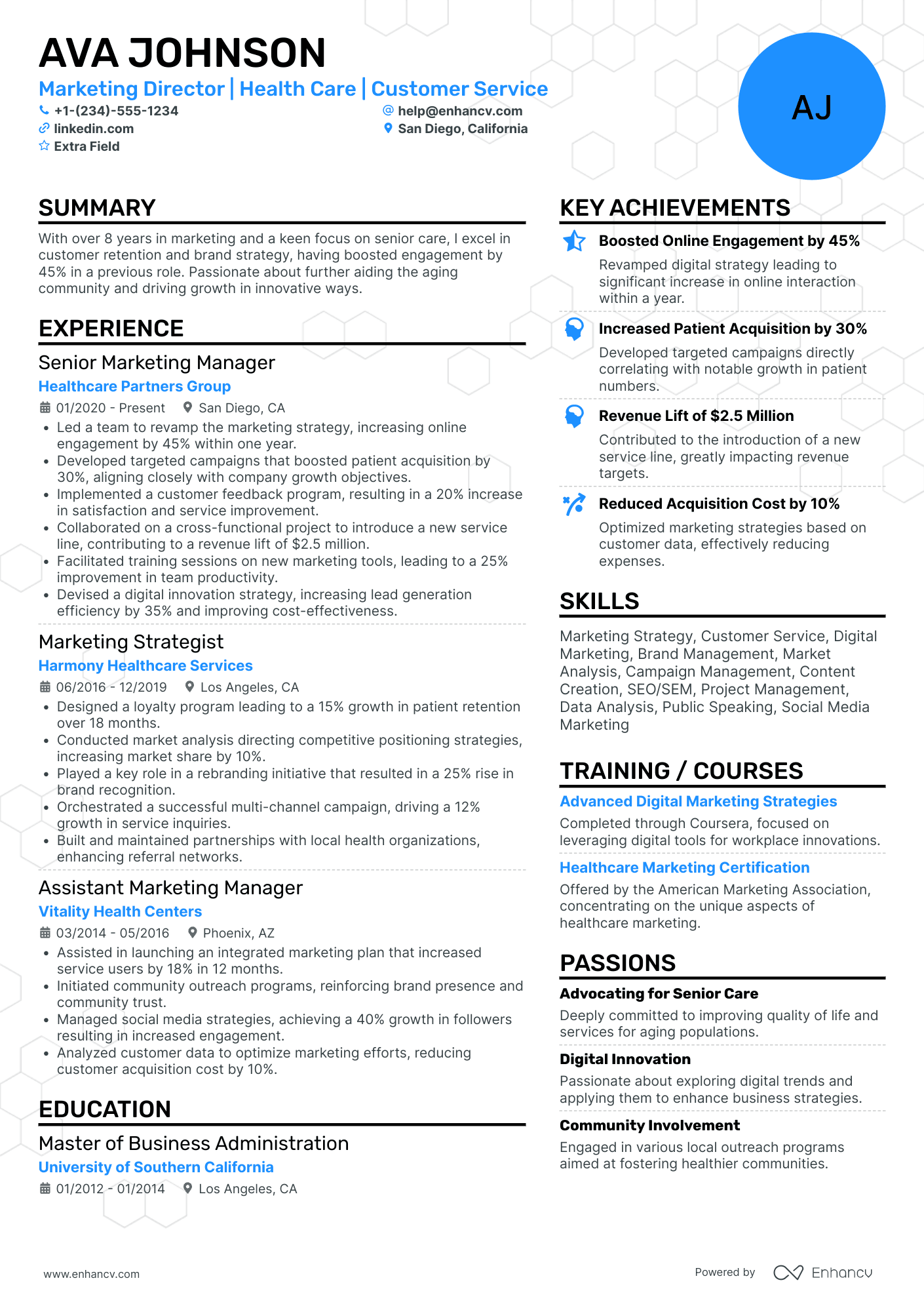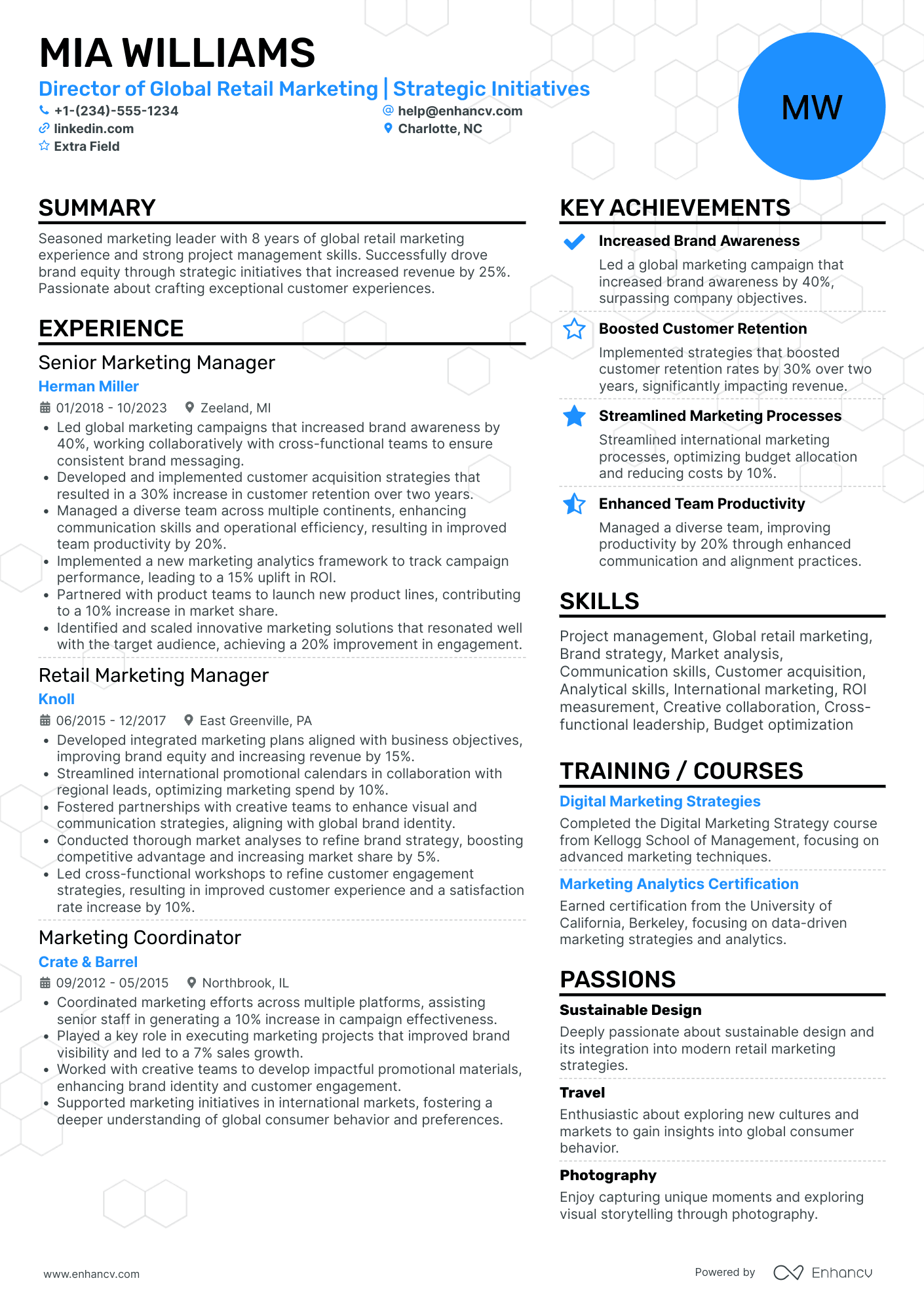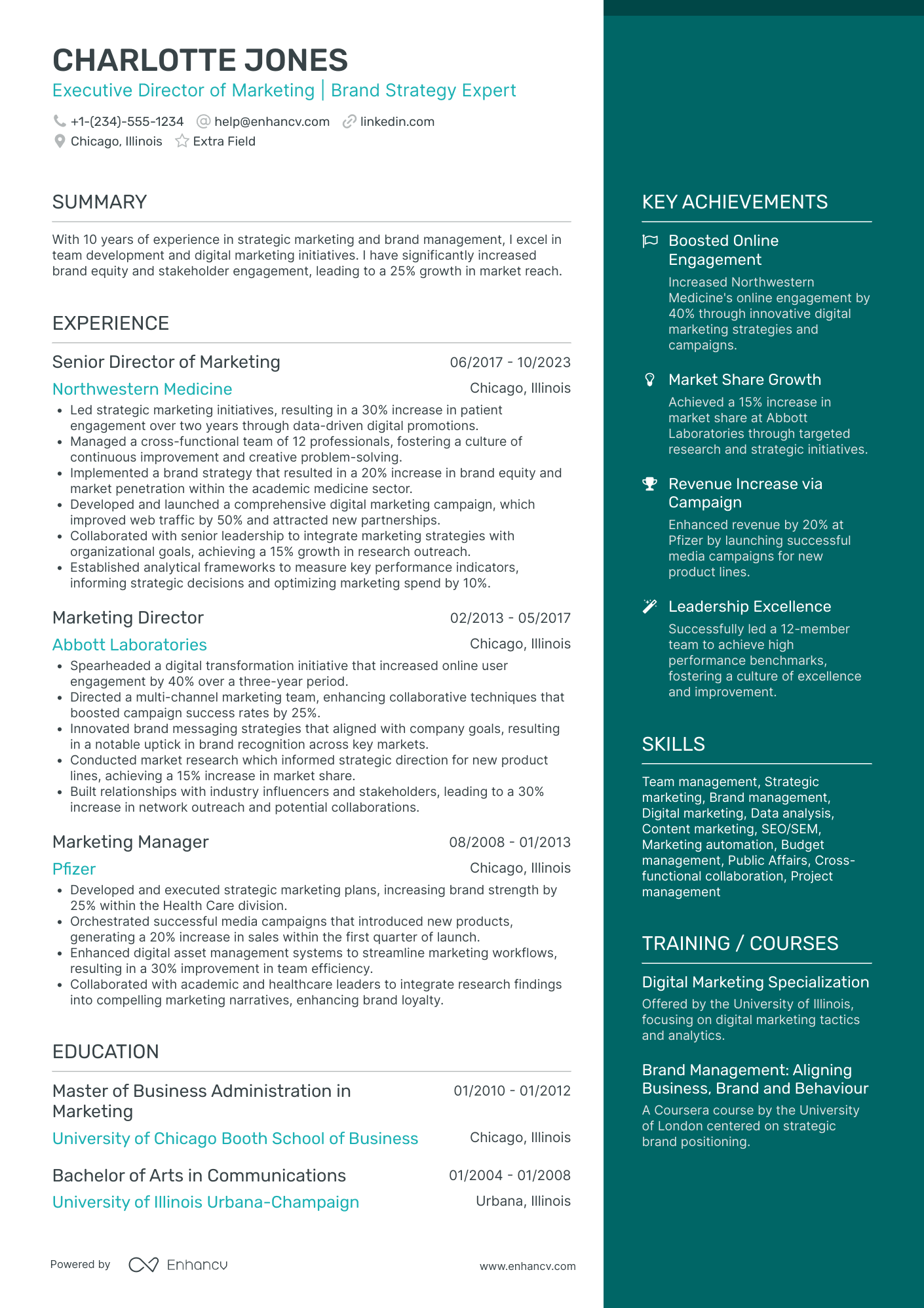Crafting a resume for a marketing director isn't just about listing experience—it's about marketing yourself as the star product of your career!
In the constantly changing landscape of modern business, the role of marketing directors has expanded significantly. It's no longer enough for them to simply manage a creative team and develop effective advertising campaigns. Today, they must also possess expertise in a variety of areas including data analysis, content creation, social and media relations, product marketing, digital marketing, and lead generation, to name a few.
A top-notch resume can really help you "stand out" in this competitive market. Interestingly, as digital platforms continue to shape industries, the demand for skilled marketing directors is expected to grow by 10% over the next decade, outpacing many other professions.
This position not only commands a strategic mindset but also a knack for creativity and innovation, making it crucial for aspiring directors to highlight not just their achievements, but their forward-thinking approaches.
Whether you're looking to steer a startup or revamp a Fortune 500 company's strategy, your resume is your personal brand campaign.
Let's dive into how to tailor your career accomplishments and skills to capture the essence of a visionary marketing director, preparing you for a future as dynamic as the immersive ads of the 21st century!
This guide aims to cover the following:
- Properly formatting a resume for a marketing director.
- Crafting a work experience section that will both impress and compel.
- The purpose and method of listing past marketing campaigns and projects.
- The significance of effectively presenting your skills on a resume along with a plethora of relevant examples (both hard and soft skills included)
- Successfully using your education and certifications to demonstrate your ambition and fundamental knowledge.
- Writing the best resume summaries possible to appeal to the recruiter and sell yourself to the job.
- Additional sections that could be extremely beneficial to your candidacy.
Here are some links to further guides related to marketing that may be useful for you:
- Marketing Project Manager Resume Guide
- International Marketing Manager Resume Guide
- Regional Marketing Manager Resume Guide
- Assistant Marketing Manager Resume Guide
- Marketing Manager Resume Guide
- Chief Marketing Officer Resume Guide
- Digital Marketing Executive Resume Guide
- Marketing Operations Manager Guide
- Senior Marketing Manager Resume Guide
Need a cover letter with that resume?
Marketing directors often have to possess a diverse set of skills, blending creativity with analytical abilities to effectively manage their brands and lead their teams. They’re not just responsible for crafting compelling marketing campaigns but also for analyzing data to measure the effectiveness of their strategies and optimize future efforts.
How to format a marketing director resume
When formatting a resume for a marketing director, there are three main types of resume formats to consider: reverse chronological order, functional, and hybrid. Each has its merits depending on the candidate's background and career objectives:
- Reverse chronological format: This format lists job experiences in reverse chronological order, starting with the most recent. It's best for candidates with a strong, continuous work history who want to highlight their progression in the marketing field.
- Functional format: This format focuses on skills and experiences, rather than a chronological job history. It’s suitable for those with gaps in their employment or those transitioning from another career into marketing, as it allows the candidate to showcase their relevant skills upfront.
- Hybrid format: Combining elements of both chronological and functional formats, the hybrid resume lists skills and qualifications at the top, followed by a chronological work history. It's ideal for marketing directors who want to highlight specific marketing skills and a solid employment history.
For a marketing director, the hybrid format is often the best choice. This format allows the candidate to prominently display their core marketing competencies and achievements at the top, while also detailing their professional journey and growth in the marketing sector, catering to both human readers and ATS.
Further considerations for crafting your resume:
Resume designs
- Margins: Stick to 1-inch margins to keep the layout clean and uncluttered.
- Colors: Use subtle colors on your resume if any (like blues or greys) to maintain professionalism.
- Fonts: Choose easy-to-read resume fonts like Arial, Times New Roman, Rubik, or Calibri, and keep the size between 10 and 12 points.
- Columns: We recommend choosing a double-column format, which allows you to include more information in a compact layout.
- Length: Keep your resume length to one page or two pages, depending on the depth of experience.
Contact information (resume header)
- Address: Generally, your city and state suffice—no need for a full address.
- Links: Include professional links like your LinkedIn profile or digital portfolio.
- Photo presence: Typically, it's advisable to leave resume photos off to avoid any unconscious biases.
ATS compatibility
- Keywords: Use keywords from the job description throughout your resume.
- Simple formatting: Avoid headers, footers, tables, or other complex formatting that might confuse the ATS.
File formatting, naming convention, etc.
- Simple formatting: Steer clear of graphics and tables since they might perplex ATS systems. If you want to creatively enhance your application, consider using one of our reliable resume templates, which include pre-approved design features.
- File format: Save your resume as a PDF to preserve the formatting unless otherwise specified.
- Naming convention: Use a professional format for naming your file, such as ‘FirstNameLastNameMarketingProfessional_Resume’.
These considerations help ensure that the resume not only looks professional but also passes through ATS systems effectively, reaching human eyes while presenting a compelling narrative of the candidate’s qualifications and readiness for a marketing director role.
Different markets have specific resume formats – a Canadian resume could vary in layout.
Is your resume good enough?
Drop your resume here or choose a file. PDF & DOCX only. Max 2MB file size.
Every resume needs to contain some essential components. Here are the top 5 that you’ll need on yours.
The top sections on a marketing director resume
- Professional summary: Highlights expertise in marketing. This should be at the top because it immediately presents the candidate's key qualifications and strategic vision.
- Core competencies: Details specific marketing skills. Located just below the summary to quickly showcase technical and soft skills relevant to a marketing director role.
- Professional experience: Showcases marketing leadership roles. This section is critical and should follow the skills section, offering detailed insights into previous roles and accomplishments.
- Significant campaigns: Lists major marketing projects. Placed after experience, this section provides concrete examples of the candidate’s ability to execute high-impact marketing strategies.
- Education and certifications: Demonstrates formal qualifications. Generally located towards the end, it supports professional expertise with academic credentials and relevant certifications.
Besides those important elements, there are a few things that most recruiters have a soft spot for when it comes to resumes. Here are some of the more common ones that we have compiled through our firsthand experience and research.
What recruiters want to see on your resume
- Strategic planning abilities: Recruiters look for proven skills in developing and implementing marketing strategies that align with business goals, as this is crucial for driving the company's growth and success.
- Leadership and team management: The ability to lead and manage a team is critical, as the role involves directing the marketing team and collaborating with other departments.
- Budget management experience: Handling marketing budgets efficiently is vital, showing that the candidate can maximize ROI and allocate resources wisely.
- Digital marketing expertise: In today's tech-driven market, proficiency in digital marketing, including SEO, PPC, and social media, is highly valued for expanding the company's online presence.
- Analytical skills: The capacity to analyze market trends, consumer behavior, and campaign performance is essential for making data-driven decisions and adjusting strategies effectively.
Let’s begin with our work history section and target it to an actual job posting.
How to write a meaningful marketing resume experience section
The work experience section is key in a marketing director's resume because it showcases your track record of success—it's where you "market" your career achievements. This section should highlight your strategic leadership and successful campaigns, showing how you’ve driven growth and innovation.
Here’s how to structure a work experience entry:
- Job title, company name, location, and dates of employment: Establishes your career timeline.
- Key responsibilities: Briefly describe your main duties, focusing on those that align with the job you’re applying for.
- Achievements: Quantify your successes with data and specifics, such as percentage increases in revenue or engagement, to demonstrate your impact.
- Skills and tools: Mention any key marketing tools or methodologies you’ve mastered.
This format effectively presents your experience and the significant value you've added, illustrating your capability as a leader in the marketing field.
Each entry should be concise, using action verbs to vividly describe your roles and accomplishments, making your experience compelling and relevant to potential employers. Perhaps, the most important thing to remember while creating your document is to always keep the job description in mind—tailor your resume to the job!
Your resume isn’t a tattoo – feel free to modify your resume to fit the job you want. You're not cheating – you’re simply focusing on your best qualities.
Liz Ryan, a notable career expert and contributor to Forbes
Customizing your resume for each job posting is crucial for many reasons:
- Highlights relevant skills: It allows you to emphasize skills and experiences specific to the job.
- Demonstrates commitment: It shows you're genuinely interested in the role and have researched the company.
- Ensures alignment: Customizing your resume helps illustrate how your past experiences directly apply to the job.
- Meets job criteria: It enables you to address specific qualifications listed in the job posting, making your candidacy stronger.
For more information on personalizing your resume as well as checking your current resume to see how well it aligns with the job you're applying for, check out our Targeting Resume Resources.
Example marketing director job offer
In order to underline the absolute importance of adapting your resume to individual job postings, we have chosen an actual job ad. Imagine that you see the following position available as a result of an Internet search you did and decide to apply:
Job Title: Marketing Director
Company Introduction: At FourDigital, we’re on a mission to help people do their best work and live their best lives. From the services we offer to the way we show up for each other each day, we’re fueling dreams, achieving big goals, and embracing each other’s truest selves.
Job Description: FourDigital is looking for an experienced and result-driven Marketing Director to join our growing marketing team. This role will be responsible for setting up, implementing, and managing the overall company's external digital marketing strategy. The ideal candidate will play a crucial role in achieving our business goals and objectives. Results-driven experience is a must, as well as a big passion for digital technologies and various digital marketing channels to drive growth.
You'll be connected to a marketing team that believes in high performance, collaboration, authentic communication, open feedback, and overall excellence. You’ll have opportunities to manage a wide variety of marketing initiatives— including developing thought leadership content through collaboration with subject matter experts, writing, designing, and distributing marketing and sales materials as well as planning and executing campaigns.
Essential Duties and Responsibilities:
- Work with a team to develop and execute a comprehensive marketing strategy to drive brand awareness and lead generation for FourDigital's financial services offerings.
- Design tactics focused on engaging individuals including brand building and demand generation activities while understanding and implementing compliance guidelines and scalable procedures.
- Analyze marketing performance and identify opportunities for improvement.
- Monitor and report on activities, programs, and campaigns to measure success/return on investment (ROI).
- Develop and implement a data-driven marketing strategy to reach individuals across various channels.
- Develop and execute thought leadership initiatives to position our firm as a trusted advisor in the wealth management space.
- Partner with internal stakeholders including a team of financial advisers and investment professionals to understand business needs and develop targeted client acquisition and retention strategies.
Qualifications, Skills, and Requirements:
- Display a proven ability to deliver high-quality, engaging, and impactful consumer education and communications strategies and assets that drive business outcomes.
- Experience working cross-functionally, especially across marketing, sales, and client services.
- Specific understanding of how to assess needs and opportunities, and to develop and execute a plan that achieves company objectives.
- Demonstrated record of successfully executing high-quality projects with independence and confidence.
- Ability to multi-task, prioritize multiple deadlines, and coordinate support.
- Exceptional communication, prioritization, and time management skills.
- Highly organized work style with a rigorous attention to detail and strong analytical ability.
- Strategic, metrics-driven mindset and a demonstrated commitment to driving results.
- Excellent writing and communication skills.
- Strong verbal and presentation skills.
- Self-motivated and proactive approach.
- Able to work in a very fast-paced environment.
Education, Training, and Experience:
- 8+ years of marketing experience in financial services, wealth management, investment management, or custodial space.
- Bachelor’s degree in Marketing, Communications, Public Relations, Information Design, Economics, Business, Finance, or related field.
- Demonstrated ability to write, design, and deliver content through campaigns in a B2B environment.
- Demonstrated experience working with many of the following: social, (LinkedIn, Instagram, Twitter, FB, etc.) digital, (Hubspot, Salesforce Marketing Cloud, Microsoft Dynamics, WordPress, Google Analytics), design (Canva, InDesign, PowerPoint), as well as one or more organizational platforms and Microsoft Office.
Location: United States—Remote
With the above job posting in mind, let’s craft two work experience entries and see how to properly target them to the position you’re applying for and other best practices.
Here’s the first entry and one that most likely needs some improving:
- •Managed marketing campaigns.
- •Worked with the team.
- •Increased social media followers.
- •Attended weekly meetings and handled some client communications.
The example lacks specificity by failing to detail campaign types, strategies, or outcomes, and doesn’t align with the job ad’s required skills like digital marketing or data-driven strategies. It uses vague descriptions like "managed marketing campaigns" without quantifying results or mentioning crucial technologies.
It just does not meet the marketing director’s role requirements, missing strategic leadership and impactful project execution. It also fails to demonstrate a metrics-driven mindset or the ability to independently execute significant marketing initiatives, crucial for the high-level position advertised by FourDigital.
Now we can re-imagine the entry as if the applicant has taken their time to directly target it to the particular job posting.
- •Strategic Leadership: Spearheaded the development and execution of comprehensive digital marketing strategies that increased company revenue by 45% over three years. Established a results-driven approach that aligns with corporate objectives and customer needs.
- •Team Collaboration and Management: Led a team of 30 marketing professionals and collaborated cross-functionally with sales, product development, and customer service departments to ensure cohesive brand messaging and optimize consumer experience.
- •Digital Marketing Expertise: Designed and implemented targeted marketing campaigns across various digital platforms, achieving a 30% increase in lead generation. Utilized tools such as Salesforce, Google Analytics, and HubSpot to analyze campaign performance and drive improvements.
- •Content Development and Thought Leadership: Directed the creation of high-quality content that established the company as a thought leader in digital advertising technology. Managed partnerships with major industry influencers to enhance brand visibility.
- •Performance Analysis: Regularly analyzed marketing data to assess the effectiveness of strategies and tactics. Adjusted plans to maximize ROI, achieving significant improvements in customer engagement and retention.
Here’s what they got right:
- Alignment with job requirements: The experience listing clearly shows the candidate's capability to lead a marketing team and strategize effectively, directly aligning with the requirements for the marketing director position at FourDigital.
- Quantifiable achievements: The candidate provided specific percentages to illustrate their success in increasing revenue and lead generation, which helps to establish credibility and gives concrete examples of their effectiveness.
- Relevant skills and tools: Mentioning experience with specific marketing tools and platforms like Salesforce and Google Analytics is relevant to FourDigital’s focus on digital technologies.
- Leadership and collaboration: Highlighting leadership over a sizable team and collaboration across different departments showcases their ability to manage and work within a team-oriented environment.
- Adaptability and strategic thinking: The ability to adjust marketing strategies based on performance analytics demonstrates a strategic, results-driven mindset, which is critical for the role at FourDigital.
This example positions the candidate as a seasoned professional with relevant experience, a strategic approach to marketing, and a proven track record of delivering results, all of which are crucial for a role as a marketing director—in particular, the position offered in our example job ad.
Let’s talk a little bit more about using numbers on your resume and how they can really put you above the other candidates.
How to quantify impact on your resume
Creating an impact on a marketing director’s resume by making it more number-oriented involves quantifying your experiences and accomplishments. Here's how and why this approach is beneficial.
How to create a number-oriented impact:
- Quantify achievements: Whenever possible, add numbers to illustrate your achievements. For instance, if you completed a significant project, mention the scale.
- Include metrics: Use metrics to describe the impact of your internships, previous jobs, education, etc.
Why it's important:
- Demonstrates measurable impact: Numbers provide concrete evidence of your capabilities and show that you understand the value of outcomes, not just tasks.
- Increases resume clarity: Numbers break down your contributions into clear, digestible facts that are easy for hiring managers to understand at a glance.
- Enhances ATS performance: Many automated systems (ATS) that companies use to screen resumes are set to pick up on quantifiable data as indicators of a candidate’s potential impact.
- Sets you apart: Showing quantifiable achievements can differentiate you from others who only list duties.
Incorporating numbers into your resume demonstrates your practical skills and ability to deliver tangible results, making your document more compelling and often pivotal in securing an interview.
PRO TIP
Creating impact on a resume is your battle cry in the job market! It transforms your achievements into vivid, compelling stories that captivate recruiters, making you an unforgettable candidate in a sea of standard profiles. It’s about standing out, not just fitting in!
Here are some targeted ways you can quantify the impact based on the job offer from previously in the article (refer back to it if needed!).
- Specify the growth rate of follower engagement under your leadership: This aligns with the company’s goal of driving brand awareness and lead generation through digital channels, which requires effective engagement strategies.
- State the conversion rates improvement from your initiatives: Relevant because the role is focused on implementing and managing digital marketing strategies that drive growth, making conversion rates a key metric for success.
- Quantify the increase in lead generation through targeted campaigns: Directly pertains to the essential duties of developing and executing comprehensive marketing strategies aimed at lead generation for the company’s financial services.
- List revenue growth attributed to new product launches you managed: Important as it demonstrates the ability to successfully market and drive sales for new initiatives, aligning with the goal to achieve business objectives through marketing strategies.
- Report the ROI from specific marketing channels you optimized: Highly relevant since the job description emphasizes the importance of analyzing marketing performance and identifying opportunities for improvement, with a focus on ROI.
Other ways that a director of marketing might find themselves able to create impact are:
- Include percentage increase in market share due to your campaigns: Demonstrates your ability to significantly expand the company's market presence.
- Specify the growth rate of follower engagement under your leadership: Shows your skill in boosting interaction on digital platforms, which is crucial for brand visibility.
- Mention the cost reduction achieved through optimized marketing strategies: Highlights your effectiveness in increasing profitability by reducing expenses.
- Detail the customer retention rate improvement: Shows your ability to maintain customer loyalty, which is vital for long-term business stability.
However, not all of us have the relevant experience to utilize these tips and methods. While some have rich marketing histories to benefit from, others may need to improvise.
Greatness begins beyond your comfort zone.
Robin Sharma
How do I write a director of marketing resume with no experience?
You may be asking yourself if it’s even possible to fathom landing a director’s position without related experience. Surprisingly, the answer is yes. However, it’s not going to be easy.
Here are some strategies that can help bridge the gap:
- Highlight transferable skills: Focus on the skills you've developed in other roles that are applicable to a marketing director position. For example, leadership experience, project management, strategic planning, and data analysis are all highly relevant. Clearly illustrate how these skills can be directly applied to the responsibilities of a marketing director.
- Show your learning and adaptability: Demonstrate your ability and willingness to learn quickly and adapt to new fields. You could mention any relevant courses or certifications you've completed, particularly those related to marketing or digital technologies.
- Leverage your network: Use your professional network to get referrals. Sometimes, a strong recommendation from a trusted colleague can help mitigate a lack of direct experience.
- Focus on related achievements: If you have experience in related areas like sales, customer service, or content creation, emphasize how these roles have prepared you to understand the market, consumer behavior, and effective communication strategies.
- Articulate your vision: Show that you have a strong understanding of marketing trends and the specific challenges and opportunities in the industry where you’re applying. Be prepared to discuss how you would approach various aspects of the role despite not having traditional marketing experience.
- Write an objective statement: This type of professional statement is best suited for individuals who have less than three years of experience and focuses on your career goals and motivations.
- Tailor your resume and cover letter: Customize your application to speak directly to the job description, aligning your non-marketing experience with the qualities and duties of a marketing director as closely as possible.
- Prepare persuasive arguments for interviews: Be ready to discuss why you’re interested in transitioning into marketing and how your background makes you uniquely qualified. Prepare specific examples that showcase your strategic thinking, creativity, and ability to drive results. Here are some more of Enhancv’s best interview tips.
Approaching the application process strategically and showcasing your broad skill set, adaptability, and understanding of marketing principles can significantly increase your chances of securing a director of marketing position, even without traditional experience.
How to list significant campaigns and major marketing projects
Including projects in a resume for a marketing director is crucial, as it directly showcases your capability to plan, execute, and manage marketing strategies effectively.
Here’s how to format this section and what it should include:
Section layout and format
- Title of the section: This section can be titled “Key Campaigns,” “Major Projects,” or “Significant Marketing Initiatives.”
- Location on resume: Place this section after your professional experience, as it serves to highlight specific achievements within the roles you’ve held. If you find yourself with a lack of space, try using an online portfolio to present your projects.
Entry formatting
Each entry should be concise and formatted for clarity. Here's an ideal structure for each project or campaign entry:
- Campaign/Project title: Start with a bold title for the campaign or project, which immediately gives an idea of the campaign's focus or goal.
- Date or duration: Specify when the campaign was executed. Include just the year or both the month and year, depending on the duration of the campaign.
- Role or position: Mention your title during the campaign, especially if it directly relates to the responsibilities of a marketing director.
- Key objectives: Briefly describe what the campaign aimed to achieve. This sets the stage for detailing your contributions and the outcomes.
- Your contributions: Specify your role in the campaign. Highlight your strategic inputs, leadership in the execution, and any innovative approaches you introduced.
- Results and impact:This is the most crucial part. Quantify the results as much as possible (e.g., percentage increase in engagement, revenue growth, lead generation improvements). Describe the impact of the campaign on the company’s goals.
- Tools and technologies used: Mention any marketing tools, platforms, or technologies utilized in the campaign, that demonstrate your familiarity with essential industry tools.
Example Entry
- •Objective: Strategically introduce a new product to global markets, aiming to establish market presence and achieve a sales target of $2M in the first quarter.
- •Contributions: Led a cross-functional team of 15, including content creators, analysts, and digital marketers; developed and implemented a multi-channel launch plan encompassing digital advertising, social media, influencer partnerships, and PR events.
- •Results: Exceeded sales targets by 25%, achieving $2.5M in the first quarter post-launch; increased brand awareness metrics by 40% across new markets.
- •Tools Used: Google Analytics, Salesforce, Hootsuite, Adobe Creative Suite.
Tips for Effectiveness
- Be specific and quantitative: Always try to quantify your achievements. Numbers provide a clear measure of success and make your contributions visible.
- Tailor your entries: Choose projects that best match the requirements of the job you’re applying for. Highlight aspects of the project that align with the prospective employer’s needs.
- Use action verbs: Start your contributions with action verbs like 'developed', 'executed', 'increased', 'optimized', etc., to convey your active involvement in achieving results.
This section not only highlights your competencies and achievements in a tangible way but also positions you as a result-oriented professional capable of managing high-stakes marketing projects.
Now that we have thoroughly gone through a few of the most essential sections of your marketing director’s resume, let’s have a closer look at the different skills that you should sprinkle around and spice up your application.
The best way to list your hard and soft skills on your resume
For a marketing director, the integration of both a hard and soft skills section is what often leads to success. While hard skills allow you to directly apply technical knowledge to marketing tasks, soft skills enable you to lead effectively, foster a productive team environment, and ensure that strategic goals are met through people management and strong leadership.
The best marketing directors seamlessly blend both sets of skills, using their technical expertise to implement successful campaigns and their interpersonal abilities to lead and inspire their teams.
Targeted hard skills
To effectively tailor your director of marketing resume for the position at FourDigital, focusing on aligning your hard skills with the requirements and duties outlined in the job posting is key. Here’s how to choose which hard skills to include:
Identify key requirements from the job description
- Review the job posting thoroughly and note down all the specific hard skills that are mentioned.
Match your skills with job requirements
- Once you’ve identified the skills from the job description, match them with your own skills. Highlight those that are a direct match or very similar. This alignment shows that you have the necessary technical expertise to perform the job duties effectively.
Prioritize relevant skills
- Since space on your resume is limited, prioritize the skills that are most relevant and significant for the role. For a marketing director position, emphasize skills related to strategic planning, campaign management, digital analytics, and proficiency with relevant marketing technologies.
Quantify your experience
- Where possible, quantify your achievements with the skills you’re listing. For example, if you have experience with Google Analytics, mention how you used it to increase campaign effectiveness by a specific percentage.
Organize skills logically
- Organize your skills in a way that makes logical sense and is easy for hiring managers to read. You might categorize them under headings such as "Digital Marketing and Analytics," "Campaign Management," and "Design and Content Creation."
By carefully selecting and presenting your hard skills on your resume, you demonstrate that you’re a strong fit for the marketing director role. Ensure that your skills section isn’t only a list but a reflection of how your capabilities align with the specific needs and goals of the position. This approach will make your resume compelling and relevant, significantly increasing your chances of getting an interview.
Here is an extensive list:
Best hard skills for your marketing director resume
- Search engine optimization (SEO)
- Pay-Per-Click (PPC) advertising
- Social media marketing
- Email marketing
- Content management systems (CMS)
- Google Analytics 4
- Data analysis and visualization
- Customer relationship management (CRM) software
- Market research
- Adobe Creative Suite
- Video production and editing
- HTML/CSS
- A/B testing
- Marketing automation software
- Conversion rate optimization (CRO)
- E-commerce platforms
- Salesforce
- Microsoft Excel
- Digital advertising
- Strategic planning tools
The placement of your hard skills on your resume can significantly impact how quickly potential employers notice your qualifications. Here are a few strategies to ensure your hard skills are effectively showcased:
- Dedicated skills section
Create a dedicated "Skills" section near the top of your resume, just after your contact information and objective or summary statement. This section should be formatted in a clear and concise manner, often using bullet points or columns to list skills. This placement ensures that your technical competencies are immediately visible to the recruiter.
- Incorporated into the professional experience section
Integrate your hard skills within the descriptions of your professional experience. This approach shows how you've applied these skills in real-world scenarios, providing context and demonstrating the impact of your abilities.
- Highlight skills in the summary section
If particular hard skills are especially pertinent to the job you're applying for, you might also mention them in your summary (or profile) section at the top of your resume. This can grab the attention of hiring managers right away.
Targeted soft skills
Choosing which soft skills to include on your resume for a marketing director position at FourDigital should be strategically aligned with the company's values, culture, and specific job requirements mentioned in the job posting.
Here’s how to identify and select the most relevant soft skills to highlight:
Analyze the job posting
Review the job description carefully to identify key phrases and themes. For instance, FourDigital emphasizes teamwork, high performance, collaboration, authentic communication, and overall excellence. These give you hints about the soft skills that are valued.
Where to place them on your resume
- In the summary: Introduce these skills early in your resume to set the tone. For example:
“Strategic and results-driven marketing director with a proven track record in leading cross-functional teams to exceed business goals. Highly adept in fostering collaborative environments and excelling in fast-paced, dynamic industries.”
- In the professional experience section: Provide concrete examples of how you've applied these skills. For instance:
“Led a marketing team in a collaborative effort to redesign our content strategy, resulting in a 40% increase in lead generation.”
“Implemented new communication protocols to enhance internal transparency and efficiency, improving project delivery times by 20%.”
- Skills section: Although this section often focuses on hard skills, don't hesitate to list critical soft skills, especially if you can couple them with certifications or training programs that back them up.
By carefully selecting which soft skills to include and strategically placing them in your resume, you can effectively communicate your fit for the director of marketing position at FourDigital.
Here are some more soft skills that may look good on your application:
Best soft skills for your marketing director resume
Having detailed the critical role that robust work experience plays in shaping a successful marketing director resume, let's now explore the equally important aspects of education and certification, which provide the foundational knowledge essential for this leadership position.
How to list your certifications and education on your resume
These elements highlight your formal training and qualifications, which are crucial for establishing your credibility and expertise.
Let’s analyze these along with targeted examples of each:
Education
Here’s why listing your education on your resume is important:
- Foundational knowledge: Your educational background provides the theoretical foundation necessary for understanding complex marketing concepts and practices. It demonstrates your commitment to the field and shows you have a structured learning experience in relevant subjects.
- Qualification recognition: Certain positions may require a minimum educational level, such as a bachelor's degree in Marketing, Business, or related fields. Listing your education ensures you meet these basic qualifications.
Here's what an entry should typically include:
- Name of the degree: Including the type of degree (e.g., Bachelor’s, Master’s) shows the level of education attained.
- University or college name: This offers credibility and recognition; prestigious or well-known institutions can particularly strengthen a resume.
- Graduation date: Listing whether you have graduated or the expected graduation date helps employers understand your timeline.
- Grade point average (if applicable): This is only a good idea if your GPA is 3.5 or above.
- Major and minor (if applicable): This shows your area of specialization which is especially important if it directly relates to marketing.
- Relevant coursework, honors, and achievements (optional): These can be included to show specific skills or academic excellence (e.g. Cum Laude, Dean’s List) if they’re relevant.
Here are a couple of tailored education entries with the job posting from above in mind:
- •Dean’s List: Recognized for academic excellence in all semesters.
- •Capstone Project: Led a team project developing a digital marketing strategy for a major financial services company, which included comprehensive market analysis, segmentation strategies, and an omnichannel approach.
This entry is structured to not only detail the academic credentials but also to draw parallels between the candidate's educational background and the specific requirements of the job at FourDigital. It highlights relevant coursework, projects, and honors that align with the skills and experiences FourDigital seeks in a marketing director, particularly those emphasizing digital strategy, cross-functional project management, and consumer-focused marketing in financial services.
Certifications
Why include them:
- Professional development: They showcase your ongoing commitment to professional development and staying current with the latest marketing trends and technologies. This is particularly important in the rapidly evolving field of marketing.
- Specialized skills: Certifications can highlight specialized skills that are highly desirable for a marketing director, such as digital marketing, data analytics, or content strategy. They make your resume stand out by showing you have specific expertise that can directly contribute to the role.
List current, relevant certifications for a marketing director, including the name, issuer, and acquisition date. Highlight well-known certifications (e.g., Certified Digital Marketing Professional) to enhance your profile.
For simplicity, place a few certifications under the education section or, if numerous, in a dedicated section at the top to emphasize their relevance and prestige.
We have compiled the most popular certifications for a director of marketing below. If you haven’t got them—think about getting them!
Best certifications for your marketing director resume
Now that we've outlined how to effectively showcase your education and certifications, let's turn our focus to crafting a compelling personal statement that will capture the essence of your qualifications and set the tone for your entire resume.
How to write your director of marketing resume summary
A resume summary is your chance to "sum" up your professional prowess in a nutshell, making it a vital tool to hook the reader right from the start. It acts like your career’s highlight reel, showcasing your top achievements and skills, ensuring your resume doesn’t just sit on the pile but stands out. It’s your brief chance to make a big impression!
Writing a resume summary for a marketing director requires carefully chosen elements to effectively communicate your professional identity and value proposition.
Important elements to include
- Years of experience: Specify how many years of relevant marketing experience you have, particularly in leadership roles.
- Core marketing skills: Highlight key skills such as strategic planning, digital marketing, campaign management, and data analysis.
- Leadership qualities: Emphasize leadership skills and your ability to manage and inspire teams.
- Key achievements: Mention significant accomplishments like growth percentages or successful project outcomes that you can quantify.
- Alignment with company goals: Tailor the summary to reflect the goals of the company you’re applying to, showing how your background and skills will help achieve those goals.
What the summary should express
- Professionalism and confidence: Convey a professional tone that asserts your confidence in your abilities.
- Enthusiasm and commitment: Show genuine interest in the role and the company.
- Strategic mindset: Demonstrate your ability to think strategically and handle high-level responsibilities.
Here’s an excellent summary targeted towards the job posting from FourDigital:
Tips for crafting your summary
- Be concise: Keep your summary succinct yet powerful, ideally under 50 words.
- Use action words: Start sentences with verbs like “spearhead,” “drive,” and “achieve,” to create a dynamic presentation of your skills and accomplishments.
- Customize: Always tailor your summary to the specific role and company, referencing key aspects of the job description to make your fit for the role clear.
Objective statement
An objective statement on a resume isn't just for first-time marketing directors with minimal experience—experienced professionals can also use them effectively. There are no strict rules in resume writing, allowing for flexibility in how you present your career goals. A well-crafted objective should align with the company’s mission and articulate aspirational yet achievable targets, focusing on how you aim to contribute.
While a summary highlights past achievements, an objective looks forward to future goals and outlines the potential benefits to the company if hired. Remember, the impact of an objective statement hinges on its quality—well-written objectives can powerfully enhance your resume, whereas poorly crafted ones may detract from your overall presentation.
Some candidates may find themselves with extra space to fill or a desire to impress recruiters a bit more. Here are some ideas for extra sections on your application.
Additional sections for a marketing director resume
Including additional sections on a marketing director's resume can help you showcase a broader range of skills and experiences, making your candidacy more compelling. These sections provide opportunities to highlight aspects of your background that standard sections might not cover, helping you stand out from other candidates.
Here are some beneficial additional sections you might consider:
- Awards and honors: Listing awards or other recognitions can demonstrate excellence and credibility in your field. This section can set you apart as a high achiever.
- Publications and presentations: Including works you’ve published or presentations you’ve given at conferences can showcase your expertise and thought leadership in marketing. This is especially valuable for positions that require creating impactful content or public speaking.
- Professional affiliations: Memberships in professional organizations (e.g., the American Marketing Association) indicate your active participation in the marketing community and your dedication to staying connected with industry trends and networks.
- Languages: Proficiency in multiple languages can be a strong asset in global companies or roles that require international collaboration.
- Volunteer work: Volunteer positions, particularly those related to marketing or leadership, can demonstrate your initiative and commitment to the community, which are attractive qualities in a leader.
By strategically using these additional sections, you can present a more holistic view of your professional persona, showcasing not just your capabilities as a marketing director, but also your broader contributions to the field and community.
Key takeaways
As we wrap up this guide, let's distill the essential elements and practical advice into key takeaways that will ensure your resume not only meets the expectations but stands out in the competitive field of marketing leadership.
- Tailor your resume: Customize it to match the specific marketing director role and company goals you're targeting.
- Highlight key skills: Emphasize both hard and soft skills, showcasing your expertise in strategic planning and team leadership.
- Quantify achievements: Use numbers to demonstrate the tangible impact of your marketing initiatives and leadership.
- Include relevant sections: Add sections for certifications, significant campaigns, and major projects to underscore your qualifications.
- Optimize for ATS: Use keywords from the job description and simple formatting to ensure ATS compatibility.
- Focus on professional presentation: Keep your resume polished with professional fonts, colors, and a clean layout.
- Emphasize education and certifications: Clearly list your academic qualifications and relevant certifications to establish credibility.
Marketing Director resume examples
By Experience
Senior Marketing Director
Associate Marketing Director
By Role
